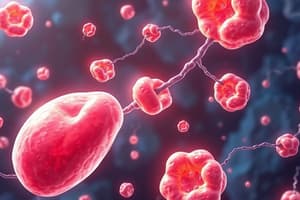Podcast
Questions and Answers
What is the primary structural characteristic of steroid molecules?
What is the primary structural characteristic of steroid molecules?
- A branched carbon chain structure
- Four fused rings forming a hydrocarbon skeleton (correct)
- A singular hexagonal ring structure
- A linear chain of carbon atoms
Which of the following compounds is considered the parent compound of all steroids?
Which of the following compounds is considered the parent compound of all steroids?
- Acetyl-CoA
- Cholesterol (correct)
- Cyclopentanoperhydrophenanthrene
- Phenanthrene
In the context of steroid nomenclature, groups above the plane of the molecule are said to be in which position?
In the context of steroid nomenclature, groups above the plane of the molecule are said to be in which position?
- δ-position
- α-position
- β-position (correct)
- γ-position
Which of the following is NOT a typical use of steroidal drugs?
Which of the following is NOT a typical use of steroidal drugs?
What is the structure consisting of three cyclohexane rings and one cyclopentane ring known as?
What is the structure consisting of three cyclohexane rings and one cyclopentane ring known as?
Which factor is important when discussing the physicochemical properties of steroidal drugs?
Which factor is important when discussing the physicochemical properties of steroidal drugs?
What is a key characteristic that differentiates agonist and antagonist steroid activities?
What is a key characteristic that differentiates agonist and antagonist steroid activities?
What is a prodrug?
What is a prodrug?
What are the primary hormones secreted by females?
What are the primary hormones secreted by females?
What distinguishes steroid hormone action in target cells?
What distinguishes steroid hormone action in target cells?
In the two-step mechanism of steroid hormone action, what happens first?
In the two-step mechanism of steroid hormone action, what happens first?
What is the primary function of mineralocorticoids like Aldosterone?
What is the primary function of mineralocorticoids like Aldosterone?
Which of the following is a glucocorticoid produced by the adrenal cortex?
Which of the following is a glucocorticoid produced by the adrenal cortex?
What regulates the secretion of Aldosterone?
What regulates the secretion of Aldosterone?
What is the main role of glucocorticoids like Cortisol?
What is the main role of glucocorticoids like Cortisol?
How do steroid hormones achieve their physiological effects?
How do steroid hormones achieve their physiological effects?
What primarily regulates the secretion of Cortisol in the body?
What primarily regulates the secretion of Cortisol in the body?
What can happen when exogenous glucocorticoids are withdrawn?
What can happen when exogenous glucocorticoids are withdrawn?
Which of the following is a therapeutic use of synthetic adrenal steroids?
Which of the following is a therapeutic use of synthetic adrenal steroids?
What is a common adverse effect of adrenal steroid usage?
What is a common adverse effect of adrenal steroid usage?
What structural feature increases the glucocorticoid activity of corticosteroids?
What structural feature increases the glucocorticoid activity of corticosteroids?
What effect can corticosteroids have on body fat distribution?
What effect can corticosteroids have on body fat distribution?
Which of the following statements about corticosteroids is true?
Which of the following statements about corticosteroids is true?
How does the 9α-F group affect glucocorticoid activity?
How does the 9α-F group affect glucocorticoid activity?
What effect does the insertion of bulky substituents on the β-side of a molecule have on glucogenic activity?
What effect does the insertion of bulky substituents on the β-side of a molecule have on glucogenic activity?
Which of the following steroids is the metabolite of Cortisone that is more active in vivo?
Which of the following steroids is the metabolite of Cortisone that is more active in vivo?
Which enzyme is responsible for the reversible metabolism of hydrocortisone to cortisone in the liver?
Which enzyme is responsible for the reversible metabolism of hydrocortisone to cortisone in the liver?
What is the primary role of 11β-HSD2 in the metabolism of steroids?
What is the primary role of 11β-HSD2 in the metabolism of steroids?
Insertion of which functional groups is known to abolish or reverse deoxycorticosterone activity?
Insertion of which functional groups is known to abolish or reverse deoxycorticosterone activity?
What is the drug of choice for replacement therapy in patients with adrenocortical insufficiency?
What is the drug of choice for replacement therapy in patients with adrenocortical insufficiency?
Which alteration to the steroid structure is known to enhance anti-inflammatory potency and glucocorticoid receptor affinity?
Which alteration to the steroid structure is known to enhance anti-inflammatory potency and glucocorticoid receptor affinity?
What is the effect of inserting a double bond between C1 and C2 on glucocorticoidal activity?
What is the effect of inserting a double bond between C1 and C2 on glucocorticoidal activity?
What is the primary role of 11β-HSD2 in the kidney?
What is the primary role of 11β-HSD2 in the kidney?
Which syndrome results from the deficiency of 11β-HSD2?
Which syndrome results from the deficiency of 11β-HSD2?
What modification is generally performed on synthetic corticosteroids?
What modification is generally performed on synthetic corticosteroids?
What is the primary function of 11β-HSD1?
What is the primary function of 11β-HSD1?
Which corticosteroid derivative has about four times the anti-inflammatory activity of hydrocortisone?
Which corticosteroid derivative has about four times the anti-inflammatory activity of hydrocortisone?
How does the geometry change in the ring-A of Δ1-corticoids affect their function?
How does the geometry change in the ring-A of Δ1-corticoids affect their function?
What is one of the main undesirable effects associated with most glucocorticoids?
What is one of the main undesirable effects associated with most glucocorticoids?
Which of the following effects of 11β-HSD1 is correlated with its presence in the liver?
Which of the following effects of 11β-HSD1 is correlated with its presence in the liver?
Flashcards are hidden until you start studying
Study Notes
Steroids
- Steroids are a class of chemical compounds vital in animal and plant biology. Examples include:
- Sterols
- Bile Acids
- Steroidal Hormones
- Steroids are widely used medicinally:
- Birth Control
- Hormone Replacement Therapy
- Inflammatory Conditions
- Cancer Treatment
- Most steroids have a common structural backbone:
- Steroid Backbone
Structure, Stereochemistry and Nomenclature of the Steroid Backbone
- The steroid backbone consists of four fused rings:
- Three Cyclohexane rings (A, B, C)
- One Cyclopentane ring (D)
- The numbering for steroid structures is unique.
- Groups above the plane of the molecule are in the β-position, while those below are in the α-position.
Steroid Synthesis
- All steroids are synthesized from cholesterol, which is synthesized from acetyl-CoA
- Estrogen, Progesterone, and Testosterone exist in both males and females, but in different amounts:
- Females primarily secrete Estrogens and Progesterone
- Males primarily produce Testosterone
- These differences in hormone production drive the development of distinct reproductive systems and physical characteristics between men and women.
Mechanism of Action
- Steroid hormones act by regulating tissue-specific gene expression and protein biosynthesis in target cells.
- They exhibit remarkable tissue specificity.
- Steroid hormone receptors in different tissues are responsible for this specificity.
- Steroid hormones act in a two-step process:
- They bind to nuclear membrane receptors inside the cell to form an activated hormone-receptor complex.
- The activated complex binds to DNA, triggering the expression of specific genes.
Adrenal Steroids
- The adrenal gland produces two types of hormones:
- Adrenal medulla: secretes catecholamines (primarily epinephrine)
- Adrenal cortex: secretes adrenal steroids (corticosteroids)
- Two main types of adrenal steroids are:
- Mineralocorticoid (MC): - Primarily aldosterone - Regulates salt and water balance
- Glucocorticoid (GC): - Primarily cortisol (hydrocortisone) - Regulates carbohydrate, lipid, and protein metabolism - Inhibits inflammation reactions - Suppresses immunity
Cortisol Production
- The secretion of cortisol is controlled by the hypothalamus (through corticotropin) and the pituitary gland (through adrenocorticotropic hormone (ACTH)).
- Cortisol and other glucocorticoids act as feedback inhibitors of both ACTH and corticotropin. This can lead to adrenal insufficiency when exogenous glucocorticoids are withdrawn.
Therapeutic Uses of Adrenal Steroids
- Treat adrenal insufficiency (Addison’s Disease)
- Manage rheumatoid diseases and allergic manifestations (e.g. severe asthma, rheumatoid arthritis, rheumatic fever)
- Suppress inflammation regardless of the cause.
- Important to note: Corticosteroids only provide palliative treatment and are not a cure.
Adverse Effects of Adrenal Steroids
- Salt and water retention (hypertension and Cushing’s Syndrome)
- Redistribution of body fat (Buffalo hump, Moon face)
- Enhanced lipolysis and increased triglycerides
- Inhibition of prostaglandins synthesis (can worsen peptic ulcers)
- Increased gluconeogenesis (leads to glucose intolerance)
Structure Activity Relationships for Corticosteroids
- Essential structural elements for activity:
- C=O at C3
- A double bond between C4 & C5
- Oxygen at C11 (C=O or OH)
- β-ketol side chain at C17
- Factors that increase glucocorticoid activity:
- α-CH3 groups at positions 6 and 16
- 9α-F group prevents metabolic oxidation and increases receptor dissociation
- 16α or β-CH3 blocks hydroxylation
- All trans (B/C and C/D) backbone
- 11β-OH
- Factors that decrease sodium retention:
- 16α-OH group
- Bulky substituents on the β-side of the molecule abolish gluconeogenic activity, while those on the α-side do not.
Systemic Glucocorticoids
- Cortisone:
- 11-keto analog of cortisol
- Orally active
- Used for replacement therapy in adrenocortical insufficiency
- Cortisol (Hydrocortisone):
- More potent and active
- Primarily inactivated by 11β-hydroxysteroid dehydrogenase type-1 (11β-HSD1) in the liver.
- Cortisone is inactivated by 11β-hydroxysteroid dehydrogenase type-2 (11β-HSD2) in the kidneys. This protects the mineralocorticoid receptor from glucocorticoids.
Synthetic Corticosteroids
- Many synthetic derivatives have been developed with modified structures to:
- Enhance anti-inflammatory activity while minimizing sodium and water retention.
- Predinsone and Prednisolone:
- Δ1-corticoids (dehydro derivatives of cortisone and hydrocortisone)
- 4 times the anti-inflammatory activity of their parent compounds.
- The increased potency of these Δ1-corticoids results from a change in ring-A geometry which increases receptor affinity.
Studying That Suits You
Use AI to generate personalized quizzes and flashcards to suit your learning preferences.




